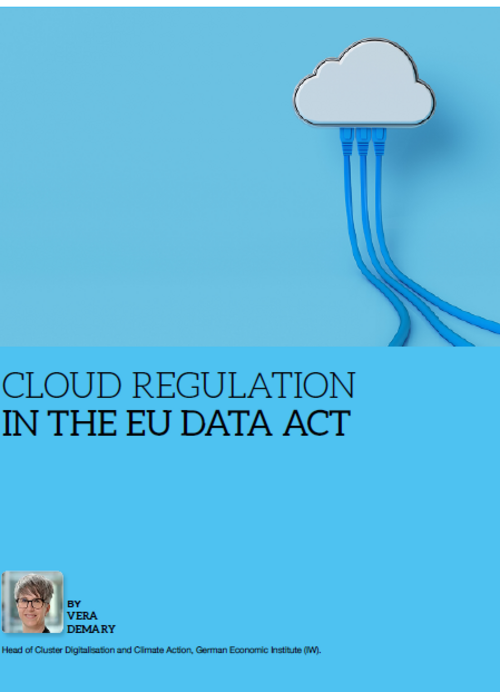The European Union values cloud computing as one of several key future technologies. It has therefore embedded goals for the technology in its Digital Decade program.

Cloud Regulation in the EU Data Act

The European Union values cloud computing as one of several key future technologies. It has therefore embedded goals for the technology in its Digital Decade program.
By 2030, 75 percent of European companies should use cloud computing in their activities, and secondly, 10,000 edge nodes will form the necessary hardware infrastructure for this endeavor. Storing data, running software, and analyzing data in the cloud open diverse opportunities for companies to become an integral part of data ecosystems and thus not only foster the digital transformation of industry and services, but also enable the green transformation. While trying to increase the number of users of cloud services to harvest the benefits of cloud computing, the European Union simultaneously regulates cloud services in the Data Act. This regulation entered into force on January 11, 2024, and will become applicable EU-wide from September 12, 2025, onwards. This paper focuses on this piece of legislation, the reasons for it, and its implications.
The European Union values cloud computing as one of several key future technologies. It has therefore embedded goals for the technology in its Digital Decade program. By 2030, 75 percent of European companies should use cloud computing in their activities, and secondly, 10,000 edge nodes will form the necessary hardware infrastructure for this endeavor. Storing data, running software, and analyzing data in the cloud open diverse opportunities for companies to become an integral part of data ecosystems and thus not only foster the digital transformation of industry and services, but also enable the green transformation.
Compared to traditional data storage and usage, cloud services offer a variety of benefits. First and foremost, cloud services enable companies to refrain from hosting onsite storage and server facilities, consequently often saving money. However, using the cloud usually also comes with secondary benefits. These range from higher efficiency due to standardized applications for day-to-day operations via increased confidence in computing security as well as data recovery because of the service provider’s experience and liability to enhanced collaboration and innovation in platform and federated cloud services. While trying to increase the number of users of cloud services to harvest the benefits of cloud computing, the European Union simultaneously regulates cloud services in the Data Act. This regulation entered into force on January 11, 2024, and will become applicable EU-wide from September 12, 2025, onwards. This paper focuses on this piece of legislation, the reasons for it, and its implications.

Cloud Regulation in the EU Data Act


Künstliche Intelligenz zur Unterstützung der betrieblichen Personalarbeit?
Bei welchen Aufgaben kann Künstliche Intelligenz (KI) die Arbeit von Personalabteilungen in den kommenden fünf Jahren sinnvoll unterstützen? Diese Frage wurde von 752 Personalverantwortlichen im Rahmen der 34. Welle des IW-Personalpanels im Herbst/Winter ...
IW
Methodenbericht Remote: Extraktion von Remote-Angeboten aus Online-Stellenanzeigen
Forciert durch den Beginn der Corona-Pandemie Anfang 2020 hat sich das Angebot von Homeoffice in der Arbeitswelt fest etabliert – knapp ein Viertel der Beschäftigten arbeitet zumindest teilweise aus dem Homeoffice.
IW